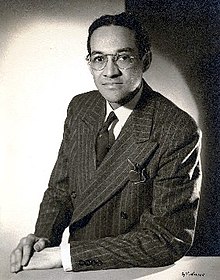Raymond Pace Alexander | |
|---|---|
 Alexander in 1943 | |
| Member of the Philadelphia City Council from the 5th district | |
| In office January 7, 1952 – January 5, 1959 | |
| Preceded by | Eugene J. Sullivan |
| Succeeded by | Thomas McIntosh |
| Judge of the Pennsylvania Court of Common Pleas No. 4 | |
| In office January 5, 1959 – November 1974 | |
| Preceded by | John Morgan Davis |
| Personal details | |
| Born | Raymond Pace Alexander October 13, 1897 Philadelphia, Pennsylvania, U.S. |
| Died | November 24, 1974 (aged 77) Philadelphia, Pennsylvania, U.S. |
| Political party | Democratic (1937–1940, after 1947) |
| Other political affiliations | Republican (before 1937, 1940–1947) |
| Spouse | |
| Children | 2 |
| Education | |
| Occupation |
|
Raymond Pace Alexander (October 13, 1897 – November 24, 1974) was an American civil rights leader, lawyer, politician, and the first African American judge appointed to the Pennsylvania Court of Common Pleas. Born and raised in Philadelphia, he became the first black graduate of the Wharton School of Business in 1920. After graduation from Harvard Law School in 1923, Alexander became one of the leading civil rights attorneys in Philadelphia. He gained prominence as a black lawyer willing to fight for equal rights in the Berwyn desegregation case and represented black defendants in other high-profile cases, including the Trenton Six, a group of black men arrested for murder in Trenton, New Jersey.
Alexander began his involvement in politics with unsuccessful runs for a judgeship on the Court of Common Pleas in 1933 and 1937. In 1949 he was considered by President Harry S. Truman for a seat on the United States Court of Appeals for the Third Circuit. He finally won a seat on the Philadelphia City Council in 1951. After two terms on the city council, Alexander was appointed to a seat on the Court of Common Pleas and was re-elected to a ten-year term as a judge in 1959. He continued to work for racial equality throughout his time in the municipal government. Alexander assumed senior status at mandatory retirement age in 1969 and died in 1974. His legacy is honored by a professorship at the University of Pennsylvania.